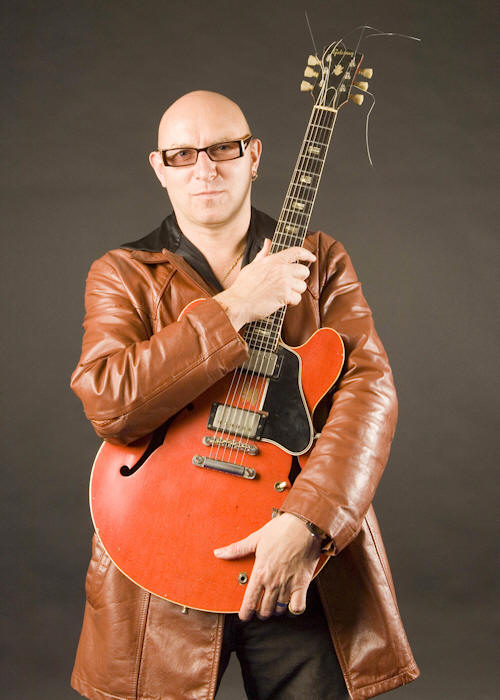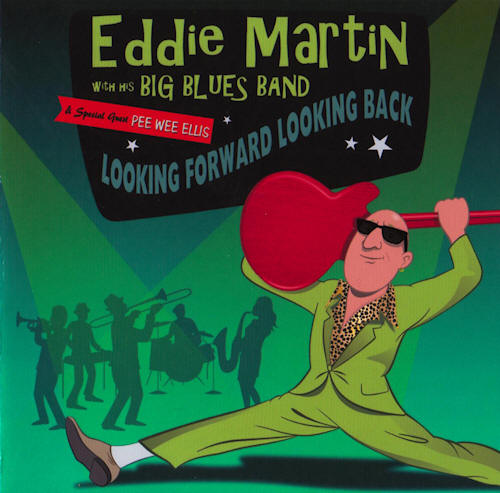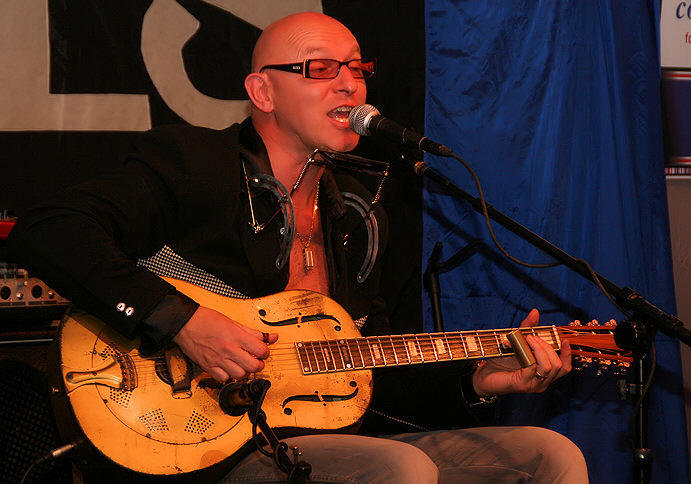
Painting © 2004 Loz
Arkle
Website
© Copyright 2000-2011 Alan White - All
Rights Reserved
Site optimised for Microsoft Internet Explorer
Early Blues Interview
|
|
"Whether he is playing as a one-man band, in a
trio or big band, Eddie Martin excels..."
"One of the UK's most dynamic performers, he is
a live act not to be missed" Alan: Firstly, where were you born and where did you grow up? Eddie: Born in London, grew up in Watford. Alan: What are your first musical memories? Eddie: Apart from singing at school, which I did a lot of because my primary school teacher was a musician, it was my Mum’s Burl Ives Folk records.
Alan: Did you
come from a musical family - is there a long musical heritage? Alan: Did you always want to become a musician? Eddie: Since 16, but as a young adult I was as much motivated by social and political change and had a simultaneous career in politics for a while alongside my music. Alan: How did you get started in music? Eddie: I Got my first guitar aged 15 and then got into British Rock and the Folk revival before getting seriously into the blues. I always was writing my own stuff solo and in a band. I did my first gig aged 16 with 2 chords and some of my Mum’s poetry for lyrics. Alan: What kind of material were you playing in the early days and who were your heroes? Eddie: Always my own stuff but initially hard rock-influenced with my band and folk/singer-songwriter on my own from the age of 15. I got seriously into the blues from 16/17. Alan: What first attracted you to the blues and what does the blues mean to you? Eddie: It was concept rock all around at the time with my school friends listening to Yes, Genesis, Gentle Giant. When I first heard Freddy King’s Burglar it knocked my socks off.. the guitar-playing was forceful, direct, exciting, sexy and beautiful, and danceable. And that is the appeal that I have ever since found in blues. Alan: Who has influenced you the most in your music writing and playing? Eddie: With harp the list starts with Little Walter, Sonny Terry, Walter Horton, The Sonny Boys, Kim Wilson, Rod Piazza, William Clarke, Mitch Kashmar, Joe Filisko, with acoustic guitar: Charlie Patton, Son House, Barbecue Bob, Robert Johnson, Lighting Hopkins, Fred McDowell, RL Burnside, Blind Blake, Furry Lewis, with electric guitar: T Bone Walker, Freddy, Albert and BB King, Elmore James, Johnny Guitar Watson, Ronnie Earl, Luther Tucker, Michael “Hollywood Fats” Mann, Otis Rush, Louis Myers, Muddy Waters, Hubert Sumlin, Johnny Winter, lyrically: Bob Dylan, Mose Allison, Willie Dixon, Johnny Guitar Watson and the older theatrical songwriters Rogers and Hammerstein, Dorothy Fields Cole Porter. Alan: Are there any particular songs that you play that have special meaning to you? Eddie: On my current album “Looking Forward Looking Back” the title track is a pretty deep summing up of where I am in my life. Other songs stand out because they are for my son Xavier aged 6 who is of course very special in my life. He loves a good story and I wrote “Kind Lady Moon” for him off my last "Folk and Blues" album. And “Frog in the Long Grass” off my new album which is also the single coming out on April 18th ( download) is about he and I finding the frog in the back garden. Alan: You've performed with many great bluesmen including John Mayall, Buddy Guy, Eric Bibb, Taj Mahal and David Honeyboy Edwards; you must have some fond memories. Eddie: The memories and the experiences are the treasure that you can’t put a price on looking back over this hard musicians life. Of course meeting with and playing with Honeyboy is very special given that he is now gone and he was one of the last living links to the founders. Pee Wee Ellis is another great musician who has a life of rich musical links to what you could call “cornerstone” music in that it is central to the roots /Afro-American heritage that is in turn the foundation of western popular music. He and I collaborated on my current album and got to play live and record and write together which was very inspiring ... and just fun coz he has some great stories. My old Texan rhythm section and me had some great experiences on the road in the US and Europe and these are high up in the “treasured” list. Alan: Tell me about your one-man-band shows, what instruments do you play and who inspired you to be a one man band? Eddie: I have always been a bit restless at just solo acoustic guitar shows and need a bit of percussion going on. So I am always experimenting with percussion to get more sounds and effects in my solo performances of songs. Mainly I play National Steel and my Kay electric for slide but also diddley-bow. All my guitars get used some time or another though. My feet work bass drum suitcase and regular bass drum, snare hi-hat/tambourine and I use shakers and occasional cymbals. I’ve studied all the greats of course Duster Bennett, Dr Ross and Son Of Dave to name a contemporary great, but end up doing my own thing really. The rack harmonica thing is what a lot of people say is my hallmark and I suppose I do more with it than anyone else I know but for me it is always about the song and adding to it anyway you can musically or rhythmically ... I don’t want my one man band stuff to be seen as a gimmick or side-show ... it’s still about adding to the performance of a song. Alan: When you toured the US I believe you had residencies in Beale Street, Memphis and in the Juke Joints of Clarksdale. How were the experiences? Eddie: Beale St and Clarksdale are almost sacred places in the history of the Blues even if Memphis seems to have more in the way of gaming halls and shopping malls as main leisure pursuits these days. The US, and Beale St and Clarksdale is particular, is the ancestral home. So, even if at the time, it was just another gig on the road, looking back it is great to say that I had residencies at the Silver Dollar on Beale, which has a lot of musical history and was just down from BB’s on Beale, and played Clarksdale Jook joints which are still alive-and-kicking like in the earliest blues times. So that was great to play one for a while. In Memphis it was great also to meet Richard Johnson and jam and see some of the other new generation of one man bands. Alan: Tell me about the harmonica workshops you run for Euroblues at the Acoustic Blues Weekend; how big are the workshops, how are they structured, when and where do they run, and who can attend? Eddie: I get students playing as much as possible, keeping my talk down to a minimum and getting those skills developing. I have written guides to refer to, of the classic skills, techniques, licks and sounds of the masters and we work through them. Numbers depend ... I have had as little as 3 and also have held workshops with 600 people in them. See www.euroblues.org website for workshops coming up. Alan: You are touring in 2012 with your Big Band and special guest Pee Wee Ellis and your Big Sound Trio, tell me a little about the bands. Eddie: The mainstay of my line-ups is my relationship with John Paul Gard keyboard and bass pedal maestro who I have been playing with for over a year now. He is a fantastic musician and enables a sound I have been looking for for ages. With Danny Cox a great and very professional young drummer my trio has a bigger sound and is more exciting than it has ever been. John-Paul is with me in the Big Band also with Richie Laws on drums. The little Big Horns are old friends, we have been playing together since 1994. They get better and better and play with a great dynamic and charismatic group sound. Patsy is ales a fine soloist and was nominated rightly in the blues awards last year. Pee Wee Ellis also played on the new album of course and was fantastic. Alan: Tell me about the making of your new album 'Looking Forward Looking Back'; who appears on the album and are all the tracks your own compositions? Eddie: “Looking Forward Looking Back” has been the first time I have written rehearsed and recorded an album in a chunk of continuous time ... in this case a fan kindly sponsored some of the project so we did it all start-to-finish in about 6 months. The album goes back to the Electric Blues Guitar Pioneers for its inspiration. I studied the old masters, and with 14 new songs, arrangements and a great band sought to resurrect the spirit and humour and excitement of pioneer recordings of the Big Band Blues genre. I love the humour and stinging guitar of Johnny Guitar Watson, the guitar innovation and suave sophistication of Big Band T Bone Walker during the Imperial Recordings and the spontaneity and blistering slide of Elmore James. And I love the fantastic horn arrangements of all three ... Moving my studio into a Bristol dance hall, the band played live-to-tape on vintage and state-of-the-art gear, and I’m really pleased at how we managed that way to evoke the “space” and energy of those inspirational recordings. My long-standing big band (together with me since 1993) is augmented here by Pee Wee Ellis who collaborated to write (as only he can!) the classic Funk Horn arrangement on track 11 “Funky One Too”. There are humorous lyrics about current events and themes and hopefully not a single re-run of any tired blues-rock licks. I am really pleased with how the recording came out. Playing the material live is going down great too, even though touring with a big band in this economic climate is not easy. Alan: How do you see the future of live blues music? Eddie: I am yearning for blues fans to love going further back than blues-rock guitar hero stuff which predominates these days but am heartened by the fact that fine young musicians are still being honed in this country, with its great passion for music. They are coming through with as much talent and energy as ever. The scene is being hit by recession - less money for going out and buying CDs - all over. But we will overcome because live music touches so many people still as a unique life-affirming experience I hope. Alan: Eddie, thank you for your time. _________________________________________________________________________
Click here for details of Eddie's new CD "Looking
Forward Looking Back"
Return to
Blues Interviews List |










